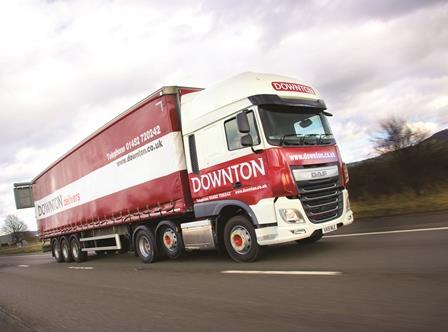
Last year industry players won their long-waged battle for a government-funded driver training apprenticeship. The Trailblazer pitch had been denied twice previously when the government said it didn’t think training a driver would stretch over the 12-month period needed to meet funding requirements.
While the Trailblazer scheme was eventually approved, CM Downton was well ahead of the game with its own 12-month driving apprenticeship.
MD Andy Downton told MT: “It’s no secret that the government’s only got a certain pool of money and that will be targeted where the best causes are. But we can’t sit on our laurels – we’ve got to invest in the future ourselves.”
With the UK still facing a driver shortage, Downton believes recruiting young drivers is the way to re-populate the industry. Since the scheme, which is run with training provider LGS Training, started in 2014, Downton has fully trained 22 new drivers who now work for the company.
“The biggest challenge facing our industry is the driver shortage, without question or doubt,” Downton said. “We have a major problem that is only going to get worse. The whole industry’s been moaning about it constantly, so we wanted to do something fresh. If we don’t invest in the future, we don’t have a future.”

The company’s year-long apprenticeship puts candidates through their HGV tests, as well as Driver CPC and forklift qualifications. They also spend time in different areas of the business, including the warehouse and traffic office.
“It’s all focused towards teaching them all facets of the industry, but the key thing for us is that at the end of it we get young people who understand everything about our business and have been trained exactly the way we want them.”
Some of the firm’s younger drivers perform much better than the old hats. Most of the 19-year-olds are getting the best telematics figures.
Downton said the stigma of young drivers is an unfortunate image problem that the industry must destroy. He added that Downton has not had any trouble as a result of taking on young drivers. “Our insurers are greatly encouraged by it.
They’ve seen the programme and they don’t see a risk,” he said. “It’s a lot less risky using a properly trained driver who is 18 but has had proper mentoring, than an agency driver walking through the door that you’ve got no knowledge or previous experience of.
“Some of the firm’s younger drivers perform much better than the old hats. They’re receptive to learning, they have young brains and they are less cynical or negative towards being retrained. Most of the 19-year-olds are getting the best telematics figures.”
Mark Austin, Downton’s first apprentice through the scheme (“I was basically the guinea pig,” he said,) agreed that young drivers get a lot of stick for their age. As far as he is concerned the less time you’ve spent driving, even just a car, the safer you’ll be behind the wheel of an artic.
“I only got my car licence three months before I started working here,” he said. “I think it was better to go straight from the car licence to learning about trucks because you haven’t had the time to build up bad driving habits.”
This said, a passed test doesn’t mean the new drivers are left to fly solo; they will spend a minimum of 12 weeks shadowing a more experienced driver.
Downton said: “As soon as they get their licence, there’s a big engagement with a driver buddy. The drivers watch them and feed back on any areas for improvement to the driving trainers.”
Austin said these weeks were invaluable to his learning experience: “You sit in the passenger seat and watch the driver, even when you’re not doing it consciously. You’re constantly looking at their eyes, looking to the right in their blind spot – you’ve just got a sense of what they’re doing, and you learn a lot from that.”
The other image problem Downton said the industry should worry about is its own.
He said: “Not everybody wants to go to university. Not everyone wants a meteoric career path. A lot of people, thank God, want to work hard, get married, bring up children and pay their taxes. And we have to commend those people, and that’s why we’re investing our money in bringing those people through our industry.

“Logistics is a fascinating industry. Every day you meet challenges and you have to overcome them, you never know what the next day is going to bring. People love that type of working environment. We can take a 19-year-old on to the apprenticeship scheme, train them up and within 12 months they could be earning between £30,000 and £35,000.”
“It’s not as unsociable as everyone thinks,” agreed Austin. “You get amazing views from being up high in the cab, and you can always have the radio on or call someone on hands-free. But I enjoy having the time to myself.”
Now a qualified driver, Austin said that although he was always interested in trucks, he’d never considered it as a career path. He found out about the scheme at a careers fair, and said he hasn’t looked back since.
The year-long apprenticeship is paid, with Downton picking up the bill for driver training along the way. He estimated the cost of each apprenticeship at £20,000. Multiply this by the two new apprentices starting every six weeks and the numbers quickly become scary.
But the investment is worth it, Downton said. “It does cost us £20,000 per candidate, but it’s a long-term investment in the relationship with that employee. You have to remember,” he added, “over the year they are doing physical work as well, and the bulk of the £20,000 figure is the salary for that work.”
The key thing for us is that at the end of it, we get young people who understand everything about our business and have been trained exactly the way we want them
By way of insurance, candidates who leave the company less than three years after graduating are obliged to repay a portion of their training costs – approximately £3,000 – but on a sliding scale according to how long they’ve worked.
Downton said the driver shortage has to be tackled and he believes apprenticeships that allow you to home-grow your own talent are the way forward.
He said: “Embrace it, because it’s the only way our industry’s going to survive. Don’t sit back and keep moaning. Get on with it and deal with it.”














